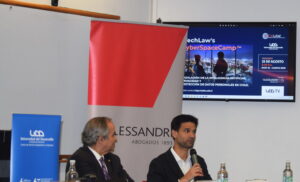/ Successful fifth edition of ItechLaw’s CyberSpaceCamp™ in Santiago addressed AI, privacy and data protection in Chile
August 28, 2023ITechLaw and Alessandri Abogados in conjunction with the UDD Law School, brought together experts in regulation, artificial intelligence and data protection in the fifth Chilean version of CyberSpaceCamp for a day of dialogue on the legal and ethical challenges in the digital era.
The fifth version of the CyberSpaceCamp™, organized by the Center for Regulatory and Business Law of the Universidad del Desarrollo (UDD) Law School, Alessandri Abogados and ITechLaw, took place on August 25, 2023. The event, held at the UDD and broadcast live, aimed to create an interactive space for the exchange of knowledge and experiences between experienced lawyers and young professionals in the country.
Through lectures and panels, the program brought together experts in law, artificial intelligence (AI) and privacy to explore the legal and ethical challenges of the digital era, such as AI regulation, cybersecurity and personal data protection in the Chilean context. Thus, attendees benefited from a variety of perspectives and insights in a format that encouraged interaction and discussion.
The day began with welcoming remarks by Matías Pascuali, director of the UDD Center for Research on Regulatory Law and Business. Rodrigo Velasco A., board member of the International Technology Law Association (ITechLaw) and partner of Alessandri Abogados, also gave the welcome and shared his perspective on the challenges and opportunities at the intersection of law and technology. Rodrigo presented on the 8 principles that ITechLaw has worked on for Responsible AI.
Exploring current and future challenges
The most outstanding keynote talk of the seminar was by Daniel Alvarez Valenzuela, National Cybersecurity Coordinator of the Chilean Ministry of Interior and Public Security. He delivered a comprehensive analysis about the evolution and challenges that regulation in the field of law and technology faces in Chile. He highlighted the existence of regulatory proposals that date back more than two decades, but regretted that they have not yet come to full fruition.
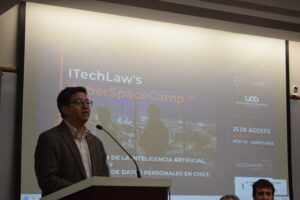
Daniel Álvarez, National Cybersecurity Coordinator of the Ministry of the Interior and Public Security of Chile.
Daniel stressed that the regulation of personal data protection in Chile was based on the Spanish law of 1986, which has failed to adapt to the demands of new technologies. He also revealed that attempts to implement digital agendas to regulate key issues in technological development and social transformation in Chile have not yielded the expected results.
The expert also addressed the complex relationship between cybersecurity and personal data protection. In this regard, he reported on the ongoing initiative to establish the “National Data Protection Agency”. This entity has as its main purpose to safeguard public security in cyberspace, anticipate and combat cybercrime in order to preserve the assets of the digital society.
Finally, the National Cybersecurity Coordinator stressed that challenges persist in the area of personal data protection, including the quality and updating of information, as well as the cost of non-compliance with regulations. Regarding cybersecurity, he emphasized the imperative need to regulate both critical infrastructure and the entire ecosystem, and thus consider the complexity of contemporary cyber challenges.
The event continued with panels that explored ethical and legal challenges of artificial intelligence, as well as the installation of the new Data Protection Agency in Chile and its relationship with other state services and regulators.
First panel: “Ethical and Legal Challenges of Artificial Intelligence”.
Presented by Oscar Montezuma, Chair of ItechLaw and CEO of Niubox Legal (Peru), the panel brought together Rodrigo Velasco, Vice-Chair of ITechLaw and partner at Alessandri Abogados, and Carla Illanes from UDD. It was moderated by María Ignacia Ormeño, Associate Attorney at Alessandri. During this discussion, participants explored the complex ethical dilemmas and legal issues surrounding the growing use of artificial intelligence in various fields and how these challenges are being addressed in Chile’s legal and regulatory environment.
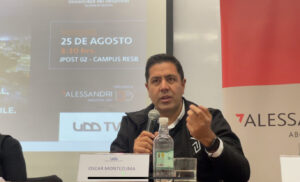
Oscar Montezuma, ITechLaw/ CEO Niubox Legal.
Oscar Montezuma addressed the historical evolution of AI and its current implications, highlighting data protection and compliance with privacy laws in the context of AI. He highlighted the debate on interaction with chatbots and the need to balance efficiency with human experience.
In addition, the expert shared regulations from the European Union and Peru’s new law, which adopts a risk-based approach to AI. In Peru, Law 31,814 promotes the ethical and sustainable use of AI, prioritizing social and economic development. In the European Union, people-centered AI is promoted, with a high level of protection for health, safety, fundamental rights and the environment. In addition, certain AI applications, such as facial recognition in public spaces and predictive policing tools, are prohibited.
For his part, Rodrigo Velasco offered guidelines for the ethical and responsible regulation of AI, seeking its benefit for society and respect for individual rights. He emphasized the importance of developers creating ethical algorithms capable of making responsible decisions, taking responsibility for the consequences and promoting transparency and understanding of these.
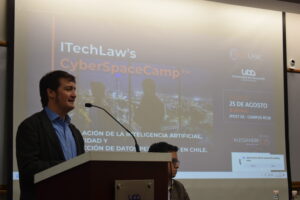
Rodrigo Velasco, ITechLaw/partner Alessandri.
Within these principles, Partner Alessandri stressed that those who develop AI technologies must be held accountable for the consequences that may arise, whether positive or negative. He also addressed the issue of fairness and non-discrimination in AI, as there is a need to ensure fair and non-discriminatory decisions, in addition to addressing security and accountability in AI mechanisms, where standardization of behavior and assurance of security and reliability is required.
In terms of privacy and data protection, Rodrigo highlighted the importance of strong regulations due to the possible massive collection of data. He also addressed the challenges of determining the ownership of works generated by AI algorithms in the field of copyright and intellectual property, which requires addressing licensing and copyright issues.
Carla Illanes, highlighted the relevance of AI in economic and social progress, as well as the challenges involved in its development. With reference to estimates by the McKinsey Global Institute, it is anticipated that innovations in AI systems could generate an annual economic impact of 6.5 to 12 trillion euros by 2025.
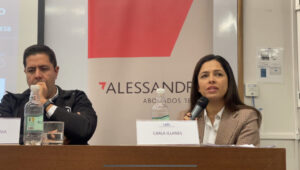
Carla Illanes, UDD.
In response to the ethical and regulatory uncertainties surrounding AI, a roadmap focused on ethical considerations was developed. Both the UN and the OECD have pointed out the lack of international coordination in the field of AI, which could disadvantage developing nations. The OECD has issued guidelines covering robustness, safety, security, trust and confidence in AI implementation.
These organizations stress the need for AI to be human-centered, fairness and transparency. They stress the importance of understanding algorithmic decisions and the delivery of the right tools to do so. An illustrative case related to the pandemic highlights the importance of a thorough risk analysis in AI development.
Therefore, ethical regulation of AI is becoming increasingly crucial on a global level. Entities such as the UN and OECD are leading in this direction by focusing on ethics, transparency and safeguarding human welfare amidst the dizzying progress of AI.
Second Panel: “Installation of the new Data Protection Agency in Chile; relationship between regulators and other state agencies”.
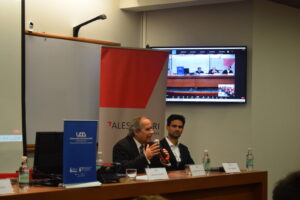
Senator Kenneth Pugh.
The Honorable Senator Keneth Pugh Olavarría, member of the Committee on Challenges of the Future, Science, Technology and Innovation of the Senate of the Republic of Chile was the presenter of this panel. The senator highlighted the importance of safeguarding personal data in an increasingly digitized world: “Personal data is an essential pillar of online life and its private nature must be respected and preserved”, he said.
In addition, he highlighted the general lack of awareness of the relevance of this protection, despite the fact that personal data fuels artificial intelligence and is critical in today’s digital economy. He also highlighted the need to establish an autonomous Data Protection Agency to ensure compliance with regulations, combined with the urgent call to pass a high quality Data Protection Law in Chile.
The panel also included the participation of Macarena Gatica, member of IAPP/Amcham and partner of Alessandri Abogados and Diego Fernández, director and member of the Executive Committee of ITechLaw, partner of Marval, O’Farrel y Mairal (Argentine law firm).
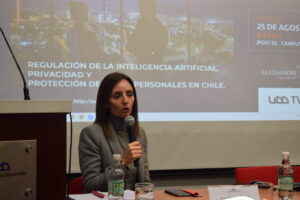
Macarena Gatica, partner Alessandri.
Macarena Gatica expressed her concern about the lack of data protection regulation, which has a negative impact on economic growth and foreign investment. This lack prevents the country from offering services that require data processing in the European and Asian markets, resulting in a significant loss of income.
In addition, the partner of Alessandri expressed that technology companies and other organizations are concerned about the high fines imposed in Chile in relation to data protection. The Fintech Law introduced serious infringements related to data protection, generating a debate on the need for a general data protection standard before implementing these laws.
To address these challenges, the importance of establishing an autonomous data protection entity and providing adequate funding to ensure effective data protection regulation was discussed.
Diego Fernández shared the Argentine experience, where a Data Protection Law has been in force for 23 years, endorsed by the European Union. He highlighted the urgency of developing a solid data and cybersecurity strategy in our country.
In addition, the expert listed as a critical factor the functional and economic independence of the supervisory authority in data protection and analyzed the impact of competition for talent between the public and private sector on the quality of regulation. Finally, the potential conflict between access to public information and data protection in legislation was addressed, where the importance of striking a balance in regulations was emphasized.
About CyberSpaceCamp™
ITechLaw CyberSpaceCamp™ provides a global platform for experienced lawyers to interact with young professionals, sharing their knowledge of technology law and practice in various jurisdictions. The events, which have taken place in several Latin American countries, are designed to address current challenges in technology law by promoting interactive discussions. Participants can interact with the experts in a format similar to master classes, either in person or online. The events are coordinated by the Latin America Membership Committee, headed by Diego Fernandez, Oscar Montezuma and Rodrigo Velasco A.
ITechLaw’s CyberSpaceCamp™ 2023 was an enriching day that brought together experts and practitioners in a space for learning and dialogue on the convergence of law and technology. Discussions and debates shed light on the regulatory and ethical challenges facing Chile in the digital age and underscored the importance of finding a balance between technological innovation and the protection of individual rights.
In line with the successful 2021 edition, this event reaffirms ITechLaw and Alessandri Abogados’ continued commitment to foster collaboration and knowledge sharing between the legal and technological community, paving the way towards a more informed and ethical legal future in the digital age.
